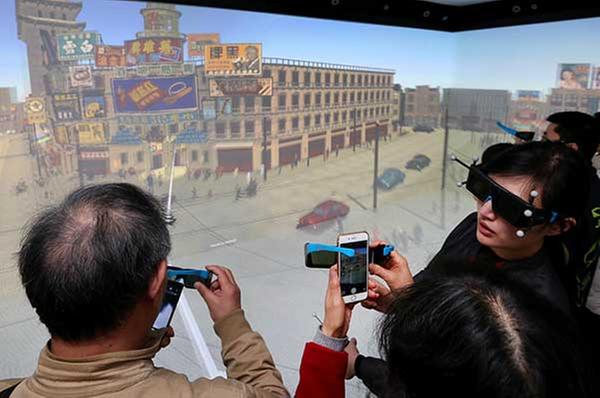How the modern world is preserving old culture
By China Daily | China Daily | Updated: 2017-04-05 07:18
 |
| People use the augmented reality feature at the Shanghai Dashijie, also known as the "Big World", which came into operation on Friday.[Photo provided to China Daily] |
The virtual reconstruction of Beijing's city gates is not the first attempt to preserve cultural heritage through the use of digital technology. In fact, augmented reality, along with other tools such as virtual reality, three-dimensional printing and drones, has already brought new possibilities for the conservation and preservation of cultural heritage across the globe.
In 2015, the UN Educational, Scientific and Cultural Organization launched the Unite4Heritage initiative, aimed at generating a global digital backup plan for threatened cultural monuments.
The campaign's Reclaim History project creates virtual versions of historic artifacts around the world through VR and 3-D printing technology, according to the project's website.
With the help of interactive computer technology, VR replicates and simulates a 3-D immersive environment, while augmented reality supplements our view of reality via computer-generated sensory input such as sound, video, graphics or GPS data.
"The use of VR and augmented reality in the preservation of cultural heritage, such as digital preservation and virtual restoration, is not only beneficial to the conservation of relics but it also increases their public exposure," said Zhou Mingquan, director of the Virtual Reality Applied Engineering Research Center at the Ministry of Education, during a lecture on the preservation of cultural heritage at Renmin University of China in Beijing.
The world is witnessing unprecedented development of the virtual and augmented reality industry. Global revenues generated by the combined market are forecast to reach almost $14 billion this year, a rise of 130.5 percent from last year, according to a report published by the International Data Corporation.
Digi-Capital, an industry observer and adviser, predicted that total augmented reality market revenues will reach $90 billion by 2020, surpassing VR, which is predicted to reach $30 billion.
Major Chinese internet companies - Tencent Holdings Ltd, Alibaba Group, Baidu Inc and LeTV - have all integrated the technologies into their strategies and product lines, investing heavily in their development in entertainment, education and journalism, among other areas.
























